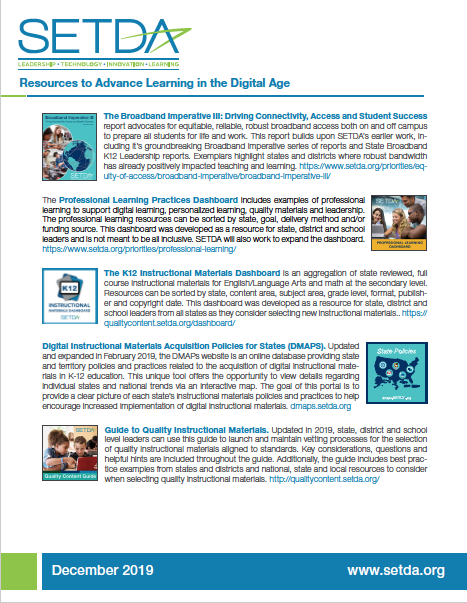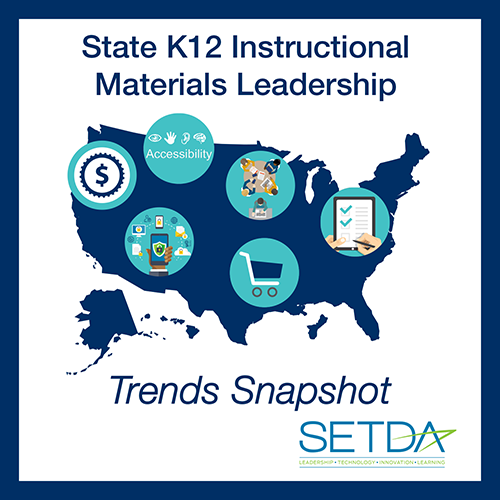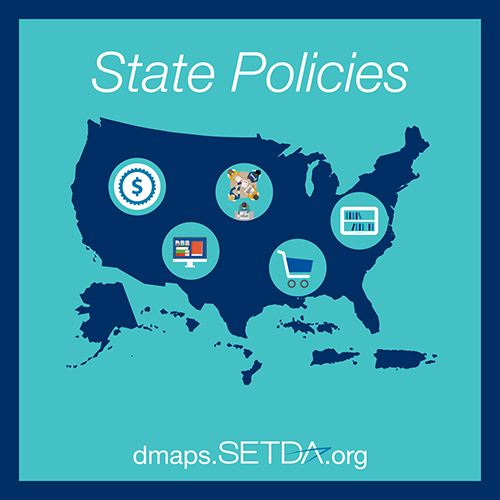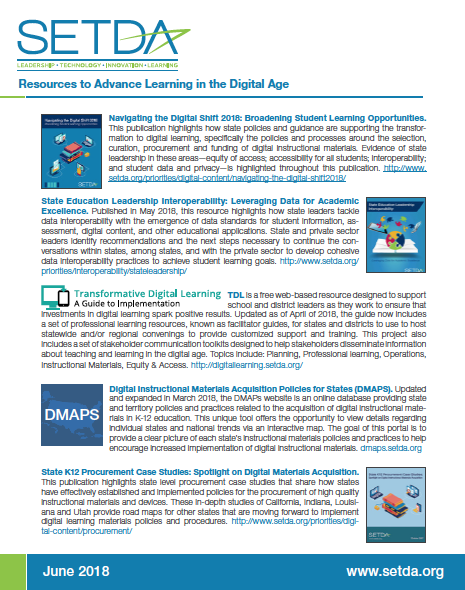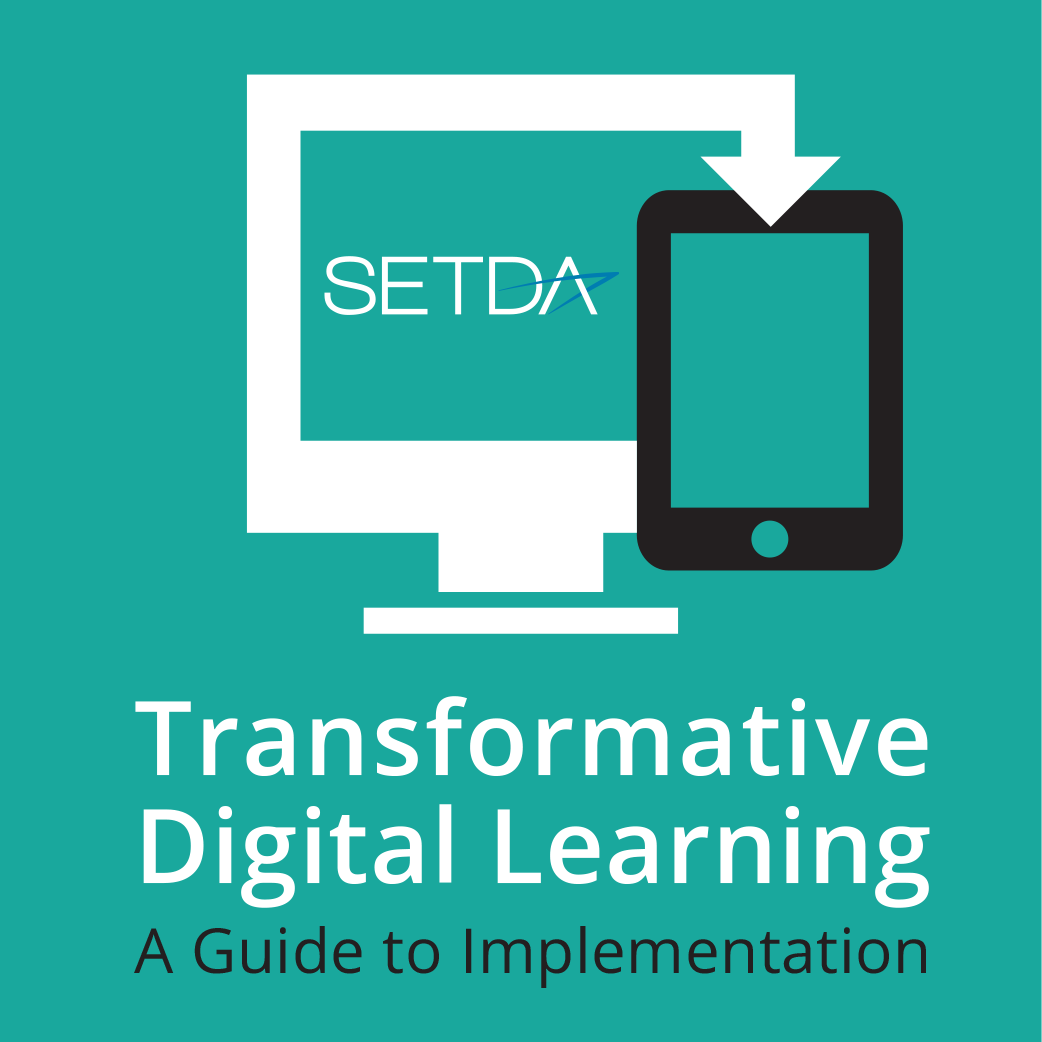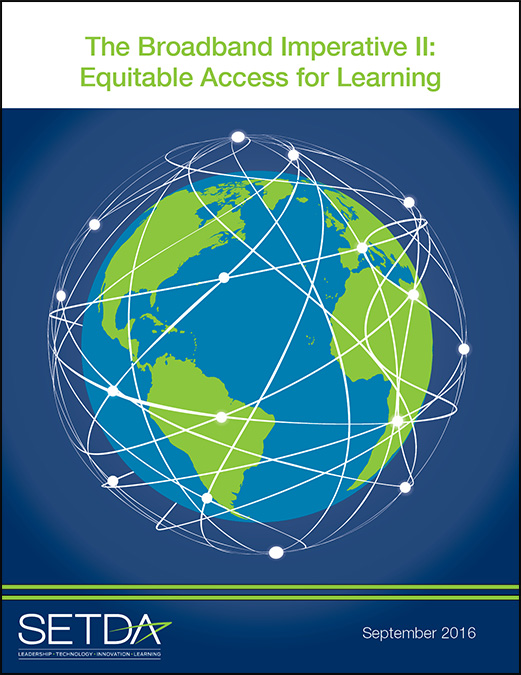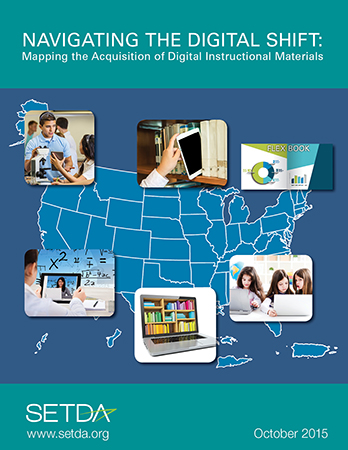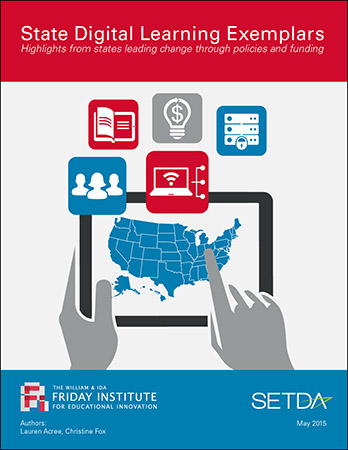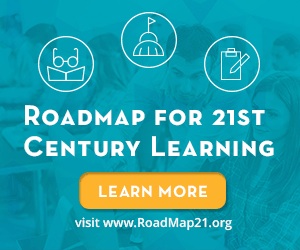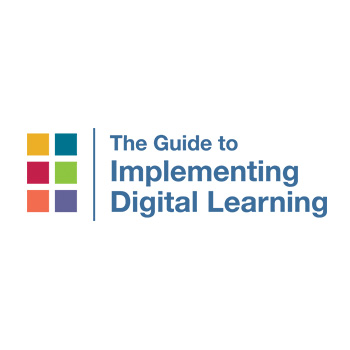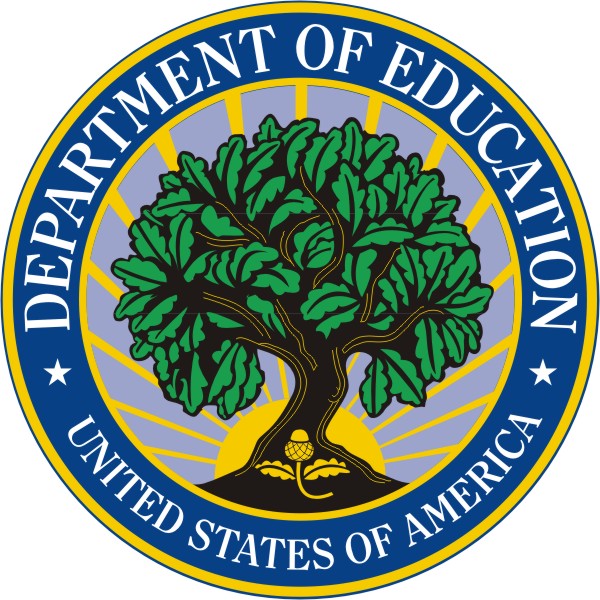FILTER RESOURCES
Categories
Formats
Topic Areas
Reset FiltersInsights and research from our members, for our members and the public
Use the filter box on the right to locate the resources meeting your criteria.
DMAPS: Digital Instructional Materials Acquisition Policies for States
Updated in 2019 (originally launched in October 2015), the goal of the DMAPS portal is to provide a clear picture of each state’s instructional materials policies and practices to help encourage increased implementation of digital learning. Educators, policy makers and private sector executives have the opportunity to learn about state policies and practices related to […]
Transformative Digital Learning: A Guide to Implementation
SETDA developed professional learning resources to help build state-level capacity for the transition to digital learning. The online tool includes a set of professional learning resources, known as facilitator guides to provide customized support and training and a set of stakeholder communication toolkits.
Broadband Imperative II: Equitable Access for Learning
In this report, SETDA continues to advocate for increasing robust access both in and out of school to best prepare all students for college and careers. SETDA provides the following updated recommendations for policy makers and school leaders:
Navigating the Digital Shift 2015 Paper
Navigating the Shift provides an analysis of state policy trends related to digital instructional materials, essential conditions for implementation, an update on the states’ progress towards SETDA’s Out of Print recommendations and highlights several next steps for consideration as leaders move to advance the learning experiences in the digital age.
State Digital Learning Exemplars
SETDA and the Friday Institute for Educational Innovation at NC State University College of Education co-released the national report, State Digital Learning Exemplars: Highlights from states leading change through policies and funding. States are striving to support the expansion of technology tools and resources in K12 education through state policies, programs and funding in order to provide digital learning opportunities […]
Roadmap to 21st Century Learning Environments
Building Your Roadmap to 21st Century Learning Environments is an innovative resource for educators. This planning tool is designed to help school leaders get the most value out of investments in high-speed broadband and digital content by crafting a comprehensive strategy to create 21st century learning environments. This resource was developed by Cable Impacts, the cable industry’s […]
The Guide to Implementing Digital Learning
The Guide to Implementing Digital Learning (GIDL) is a free web-based resource to support school and district leaders as they work to ensure that investments in digital learning spark positive results. GIDL includes six topic areas: planning, professional learning, content and software, broadband, devices and tech support.
National Education Technology Plan 2020
The National Education Technology Plan is the flagship educational technology policy document for the United States. The Plan articulates a vision of equity, active use, and collaborative leadership to make everywhere, all-the-time learning possible. While acknowledging the continuing need to provide greater equity of access to technology itself, the plan goes further to call upon […]
Texas TIP – TAPP Overview
In 2003, ED awarded $15 million in multi-year, evaluation grants to 9 states, including Arkansas, Iowa, Maine, North Carolina, Pennsylvania, Tennessee, Texas, West Virginia, and Wisconsin. The studies conducted scientifically-based research on how technology impacts student achievement in elementary and secondary education. Final reports were published in 2007. The Technology Immersion Pilot (TIP), is a […]
Wisconsin – TAPP Overvew
In 2003, ED awarded $15 million in multi-year, evaluation grants to 9 states, including Arkansas, Iowa, Maine, North Carolina, Pennsylvania, Tennessee, Texas, West Virginia, and Wisconsin. The studies conducted scientifically-based research on how technology impacts student achievement in elementary and secondary education. Final reports were published in 2007. Wisconsin took part in the “Wisconsin Proposal […]
West Virginia Technology Model School – TAPP Overview
In 2003, ED awarded $15 million in multi-year, evaluation grants to 9 states, including Arkansas, Iowa, Maine, North Carolina, Pennsylvania, Tennessee, Texas, West Virginia, and Wisconsin. The studies conducted scientifically-based research on how technology impacts student achievement in elementary and secondary education. Final reports were published in 2007. The West Virginia Department of Education established […]
Pennsylvania eSPARC – TAPP Overview
In 2003, ED awarded $15 million in multi-year, evaluation grants to 9 states, including Arkansas, Iowa, Maine, North Carolina, Pennsylvania, Tennessee, Texas, West Virginia, and Wisconsin. The studies conducted scientifically-based research on how technology impacts student achievement in elementary and secondary education. Final reports were published in 2007. The evaluation of Student and Parent Access […]
North Carolina IMPACT – TAPP Overview
In 2003, ED awarded $15 million in multi-year, evaluation grants to 9 states, including Arkansas, Iowa, Maine, North Carolina, Pennsylvania, Tennessee, Texas, West Virginia, and Wisconsin. The studies conducted scientifically-based research on how technology impacts student achievement in elementary and secondary education. Final reports were published in 2007. The North Carolina IMPACT model involves using […]
Vendor Neutral, Standards Based, District Owned: The IlliniCloud
A grassroots effort to combine resources across the state is creating powerful, integrated tools for Illinois educators. By Vicki Dewitt, Director of Area V Illinois Learning Technology Center, Melinda Fiscus, Director of Learning Technology Center 6 North, and Kathleen Barnhart, Principal Consultant for the Special Education Services, Illinois Board of Education and SETDA member.

